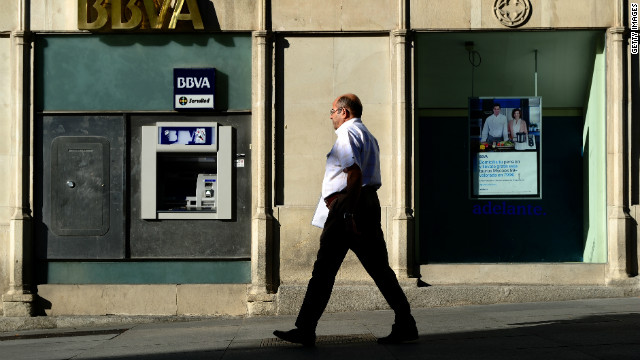
CNN) -- Spain is to be offered an initial 30 billion euros (US$36.9 billion) to bail out its troubled banks following an emergency meeting of Eurozone finance ministers.
The agreement followed nine hours of talks in Brussels that concluded early Tuesday. It was aimed at preventing Spain, the eurozone's fourth largest economy, from needing a full bailout itself.
In June, European finance ministers agreed to set aside $150 billion to shore up the capital base of Spain's banks.Madrid was also given an extra year to meet its steep budget deficit target, according to Jean Claude Juncker, Luxembourg's prime minister and the head of the Eurozone finance ministers group.
Spain had been told to cut the difference between its income and spending to within 5.3% of gross domestic product (GDP) by the end of 2012. But it will now be given until 2014 instead of 2013 to cut its deficit to below 3% of GDP.
"We are aiming at reaching a formal agreement in the second half of July, taking into account national parliamentary procedure, allowing for a first disbursement of 30 billion euros by the end of the month to be mobilized as a contingency in case of urgent needs in the Spanish banking system," Juncker said in a statement to reporters after the meeting.
The ministers from the 17-nation bloc met 10 days after their heads of government agreed to use its temporary bailout funds to recapitalize Spain's ailing financial system and to set up a joint supervisory body for the area's lenders.
Under the terms of the deal, this supervisory body will oversee the eurozone's banks and use the single currency area's rescue funds, the European Financial Stability Facility or European Stability Mechanism, to aid banks directly without adding to governments' debt.
However, the first cash injection will be filtered through Madrid's existing bailout fund.
Audits commissioned by the Spanish government recently showed its banking sector -- beset by bad debt in the aftermath of the country's property market crash -- is likely to need 60 billion to 70 billion euros in extra cash to stay solvent.
Meanwhile, Spanish and Italian borrowing costs continued to rise to unsustainable levels Monday, with Spain's 10-year bond topping the critical 7% level.
No comments:
Post a Comment